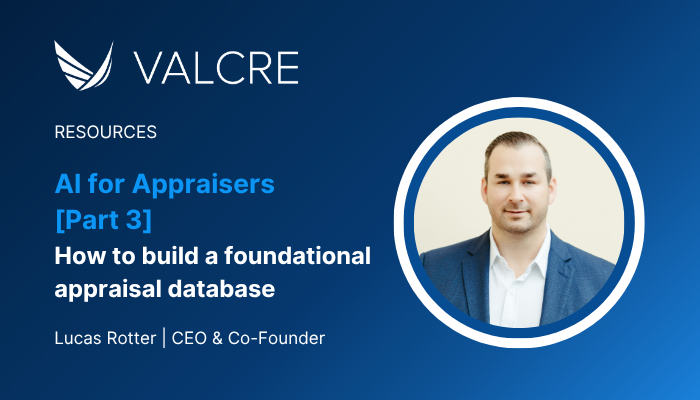What is MAI?
The MAI is recognized throughout the commercial real estate (CRE) industry as the top designation that can be achieved for a commercial real estate appraiser in the US. The MAI is the launching point for business careers in the commercial appraisal industry and is a base requirement to join most appraisal panels for lenders, corporations and law firms. Regardless of your career goals as a commercial appraiser, obtaining your MAI designation is a worthwhile venture. The education, resources, and prestige outweigh the costs (financial & time) spent to earn your “letters”.
One of the largest hurdles of obtaining the MAI designation is the substantial overall time commitment to get through the process. As appraisers, we spend our days looking for efficiency. Anything that takes away from producing reports is viewed as time misused. Nonetheless, it is important to recognize the benefit of investing in your long-term career goals, which should include the MAI designation. Plan on spending at minimum five years from start to finish to complete the process. Here are the main points to consider and the steps you’ll need to take.
How to get started?
If you are completely new to the industry or still considering appraisal as a career path, it is important to choose a firm that will nurture your development. Larger firms tend to have training programs in place and will pay for your appraisal courses, license fees, etc. However, working at a smaller firm with a senior MAI at the helm can provide better depth of knowledge in your training through more one-on-one mentoring.
As you progress through the trainee process, you will accumulate education requirements towards your general certification license as you also complete 300 classroom hours, as outlined by the Appraisal Institute (AI). Some of your undergraduate coursework may count towards these requirements. Economics, real estate and business courses are all generally helpful but check with the AI to verify which courses (and how many hours) count towards the education requirements.
Earning a general state certified license is an important milestone in your appraisal career. At this juncture your compensation typically shoots up, you can typically perform inspections independently (for many clients) and you will be applying your signature of excellence to each appraisal report. As your name is added to more and more reports in your market, clients will begin to get a comfort level with your work, which will eventually help with creating your own book of business. In my experience, it takes about five years to establish yourself within the commercial appraisal industry.
What’s Next?
After earning your state license, this is the point where pursing an MAI designation starts to make sense. This is when you contact the Appraisal Institute to request a mentor to assist in navigating the process. A mentor is a MAI in your market that is volunteering their time to help motivate you to keep moving forward towards your goal. They will also be able to answer questions, provide advice, and insights along the way.
What are the steps?
Here is a logical order to follow when completing the four basic steps to earn your MAI; (1) upper level courses, (2) comp exam, (3) demo report, and (4) experience log.
1. Upper Level Courses
Along with the classes required for your certified general state license, you will also need to complete five upper level classes to obtain your MAI. While the state-level courses are typically available through various education providers on a regular basis, with minimal travel, the upper level courses are all week-long classes and are offered only through the AI with a more sporadic schedule. It can take five years to take all the classes if you prefer not to travel.
I recommend setting up a list of the courses you need to complete and check the AI website for when they are offered near you to avoid additional delays or travel costs. Keep in mind that as these courses are all one week long and the travel costs (airfare, hotel, meals) can be as much or more than the class itself. Also, classes can fill up early so make sure you sign up as soon as the classes are announced. Note that the AI requires candidates to pass a basic Excel mastery test to qualify to take the upper level courses. This is a newer requirement but considering you have likely been appraising for at least three years to this point, you should be well-versed in Excel and this step is more of a formality.
2. Comp Exam
The comprehensive examination (comp exam) includes four separate modules. The four modules include a 1) General Concepts, 2) Cost/Highest and Best Use (HBU), 3) Sales, and 4) Income. The most taxing for most candidates tends to be the Income module. The best advice for passing this exam is to take it as closely on the heels of the Advanced Income Capitalization course as possible. Since the comp exam includes four separate modules that take information from all five of the upper level courses, it is recommended that students attend the Advanced Income class last. Although students sit for all four modules, it is possible to sit for only one module at a time. Most of the information covered in the exams will come from the upper level courses and reviewing your handbooks from each class is a great place to start studying. The Appraisal of Real Estate is an important resource as well, especially the first 150 pages (+/-). Topics covered include a broad overview of the profession and is great for the General Concepts exam. Ted Whitmer offers a popular comp exam review program, with details here: Ted Whitmer Comp Workshop.
3. Demo Report
The demonstration report (demo) has long been regarded as the most daunting portion of the process of obtaining the MAI designation. The institute completed a survey and found that a large portion of candidates wound up giving up at this point in the process. The numbers were so staggering that alternative solutions were researched. The AI website lists the seven various options available here: Appraisal Institute Demo
The most traditional method is to write a demonstration report on a property that you select. The report must include all three approaches to value (Cost, Sales, and Income) and needs to include quantifiably supported adjustments in each approach. The various requirements for the report are considerable are listed here: Appraisal Institute Demo Guidebook. Once the report is complete, a reviewer approved by the AI is engaged to grade your report. It can take a few months to get the report back and it is rare for a report to come back without comments, with candidates often required to revise certain sections. Because of the requirements of the assignment, it is highly recommended to pick a fairly homogeneous property type where adjustments can be more easily supported. Industrial or multifamily are historically the most popular choices for a demo report. A candidate can use a property they have already appraised, but only if they satisfy the USPAP requirements for confidentiality and receive permission from the client involved in the prior report. The value date cannot be more than five years from the date of submission to the Institute and cannot involve a property in litigation.
One of the most compelling alternatives is the Demo Writing Class, which has a very high success rate. Candidates are provided information on a sample property, with all the details needed to complete a demo report. Students are given a couple of months to review the materials and begin writing the report. At the end of the two months, students attend a week-long course to complete the demo under the supervision of trained instructors for the institute. At then end of the course, the reports are handed in and graded, with results available much more quickly than under previous requirements. The advantage of the new project is that appraisers spend less time researching their project and more time analyzing the data and completing the report.
4. Experience Log
Getting your hours and completing the experience log is considered the easiest and most beneficial step as it is completed within the natural course of your work. The institute currently requires proof of 4,500 hours, with a maximum of 2,000 hours in any given year. This process can therefore take anywhere from 3 to 5 years to accomplish, depending on your workload. The number of hours per job or assignment is subjective and the Institute provides tips on the process here: Appraisal Institute Exp Log Guide.
Its Worth the Time
The path to achieving the MAI designation is certainly not easy, but it is because the process is difficult, that the designation carries weight in the industry. MAI appraisers are recognized throughout the commercial real estate industry as highly qualified experts in valuation. The mere fact that a candidate has endured such a process speaks volumes to their dedication to their profession and the appraisal industry.
Additional Resources:
https://www.appraisalinstitute.org/assets/1/7/U.S._Appraiser_Demos_3_1_16.pdf
https://www.appraisalinstitute.org/assets/1/7/MAI-website1.pdf
![AI for Appraisers [Part 4]: Managing change for a successful AI rollout](https://www.valcre.com/wp-content/uploads/Blog-featured-image-–-AI-Content-Series-May-2025-8.png)

